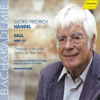Handel Saul
A glorious David but Rilling’s approach raises questions
View record and artist detailsRecord and Artist Details
Composer or Director: George Frideric Handel
Genre:
Vocal
Label: Hänssler
Magazine Review Date: 2/2008
Media Format: CD or Download
Media Runtime: 131
Mastering:
Stereo
DDD
Catalogue Number: CD98280

Tracks:
| Composition | Artist Credit |
|---|---|
| Saul |
George Frideric Handel, Composer
Christian Palm, Baritone Daniel Taylor, Alto Elizabeth Keusch, Soprano George Frideric Handel, Composer Helmuth Rilling, Conductor Kirsten Blaise, Soprano Markus Eiche, Bass Matthias Lutze, Bass Norman Shankle, Tenor Stuttgart Bach Collegium Stuttgart Gächinger Kantorei Takako Onodera, Contralto (Female alto) Wolfgang Frisch, Tenor |
Author: David Vickers
The choral singing is disciplined and there can be a pleasing richness and depth to its sound (the confidently declaimed “Envy, eldest born of hell”, for example), but the choir’s blend is stretched thinly when sopranos reach up into the higher register, and is too unwieldy in contrapuntal choruses that require better transparency and balance (“Welcome, welcome mighty King” is a mush). Bach Collegium Stuttgart plays with surprisingly lively elegance, and Rilling articulates much of the music nicely.
Such good work is undone by Rilling’s failure to realise the musical expression of more extreme passions: Saul’s “A serpent in my bosom warm’d” sounds jaunty and a shade peeved rather than irrationally psychopathic, and Merab’s “Capricious man” conveys nothing of the extremes alike in love and hate mentioned in the text. One can sense the singers desperately trying to raise the emotional stakes despite Rilling’s bland smoothness, but matters are made worse by painfully stilted recitatives (often with irritating long-delayed cadences in the continuo accompaniment). Rilling adopts the unendearing anachronism of assigning a different continuo team to each character. This is a waste of energy and also dramatically nonsensical always to accompany David’s recitatives with a harp when he is clearly not always supposed to be playing it. Handel’s score is tinkered with in several ways that undermine his careful control of dramatic orchestration: Rilling gets his flutes to double the oboes in many movements, which makes the militaristic symphonies incongruous and ridiculous.
Discover the world's largest classical music catalogue with Presto Music.

Gramophone Digital Club
- Digital Edition
- Digital Archive
- Reviews Database
- Full website access
From £8.75 / month
Subscribe
Gramophone Full Club
- Print Edition
- Digital Edition
- Digital Archive
- Reviews Database
- Full website access
From £11.00 / month
Subscribe
If you are a library, university or other organisation that would be interested in an institutional subscription to Gramophone please click here for further information.




